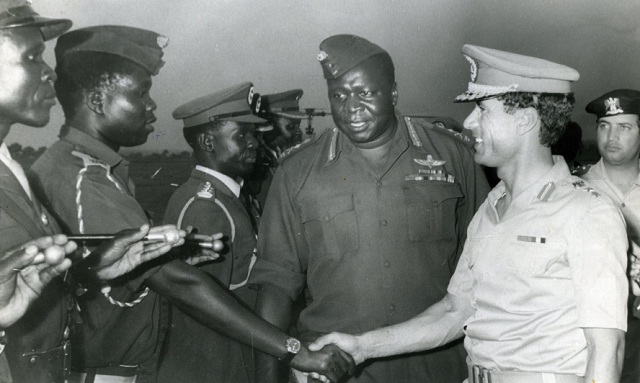
Kampala, Uganda | THE INDEPENDENT | Children who were caught up in the war to remove President Idi Amin Dada from power continue to relive their experiences 43 years later.
Uganda Radio Network has traced some of them, now adults in the late 40s and 50s, and they share memories of being moved from home to home as their parents shielded them from the brutal war.
Barbara Birungi, aged 49, recalls having a blissful childhood where she would roam Bugonga village in Entebbe with friends and cousins after school and on weekends.
Birungi, who was six years at the time, says she would walk to and from Queen’s Road Nursery School and, in her words, “life was good”. She says two of Amin’s children were in the same school but she did not know them personally. The school, located in Kitooro, is no more after it was turned into a commercial place and currently houses Entebbe Flight Motel.
Birungi says that, before the 1979 war, people moved freely within Entebbe town and Bugonga village amidst the presence of Uganda Army soldiers deployed in the area and the roads leading to State House and Entebbe International Airport.
Birungi, a graduate of fisheries management and technology from Fisheries Training Institute – Entebbe, says school-going children in Queen’s Nursery School and Lake Victoria Primary School and their parents would have parties and swim at a beach famously called Amin’s Beach on Eric Magala Road in Bugonga. President Amin frequented the beach in the evenings. “I did not meet Amin physically but I would hear people saying Amin had come or was at the beach…. I also remember there was a Congolese band that played music at that beach,” she says.
Civilians would however return home around 8pm because Uganda Army soldiers were enforcing night curfew. These soldiers would drink locally brewed alcohol at a joint called Mutukula in Bugonga village, a few metres from Amin’s beach.
Birungi says that she and her friends suddenly stopped going to school one day. Her parents and her maternal aunts decided to take her and other children at their home to another home where her maternal grandparents lived. The home was also in Bugonga village.
Birungi however says they noticed changes at their grandparents’ home, whereby they had to stay indoors. The once friendly soldiers became tougher and started beating up people during the day so people had to comply with the curfew.
On April 11, 1979, Amin’s government was overthrown by a combined force of the Tanzania People’s Defence Forces (TPDF) and other fighting groups comprising Ugandans who were living in exile. Amin lost the five-month war that started in October 1978 when he ordered Ugandan soldiers to invade and annex Tanzania’s Kagera Province.
Birungi says she still has memories of the deafening sound of rockets locally known as saba saba that were launched by Tanzanian soldiers in Entebbe. The Battle of Entebbe lasted three days, ending on April 7, 1979.
Birungi says her grandmother would take her and the over ten grandchildren to seek refuge at the Fisheries Training Institute at night while other villagers run to Bugonga Catholic Church. “During the day we would hide in the house and at night we would be at the institute. It was insecure to sleep at home because our parents later told us that soldiers would make foot patrols and loot at night,” she narrates.
Apart from hiding under chairs and beds during the three-day bombardment in Entebbe, they were made to eat “porridge with beans or mingled cassava flour without sauce.”
Thomas Businge Tibenderana, aged 10 years at the time, was residing near Uganda Virus Research Institute-UVRI, Entebbe. He recalls that whenever saba saba rockets exploded, they would gather as children and run to see where it landed. They were curious to know what it looked like.
The children however ran back to hide inside their homes after another rocket was launched. Businge says this particular rocket exploded on the compound of one of the neighbours, destroying part of the house and also injuring four people.
Fifty one-year-old Paul Nsereko says they were six children. His father, Ben Nsereko, decided to split the family when the invading army captured Mutukula, Masaka and Lukaya in quick succession and were now advancing on Entebbe. Nsereko, an economist, says in early April 1979, he went with his 11-year-old sister to live with relatives in Bulenga while his mother and father remained in Entebbe with two other children.
Nsereko says while he did not experience what Birungi and Businge went through, he returned to Entebbe two months later and found two people who had sustained injuries from sharp fragments of launched rockets in Kitooro and Lugonjo areas.
Charles Busulwa, one of Nsereko’s brothers, was in Masaka during the war. Busulwa, aged 18 years in 1979, was at Masaka Technical College when the anti-Amin troops advanced into Ugandan territory. Busulwa, a social worker, says his father instructed him to join other relatives living in Masaka instead of returning to Entebbe. So he fled with close to 20 relatives a few days before Masaka was captured and hid in a village in Kalungu where there was little or no fighting.
He says they heard about the destruction in Masaka when Amin and Uganda Army soldiers tried to attack and counter-attack the “liberators”
*****
URN
 The Independent Uganda: You get the Truth we Pay the Price
The Independent Uganda: You get the Truth we Pay the Price





Having been children at the time let them say the truth about the Mzinga square
It will save this nation from distorting our history!
It is quite annoying for some who know the truth, especially when such information is used for tourism purposes
Knowledge should be acquired from authentic sources.
“Uganda Moto”